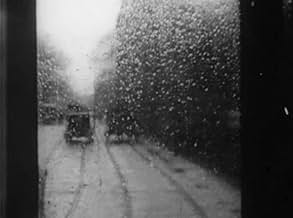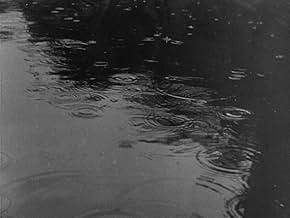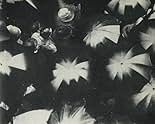Regen
- 1929
- 14 min
AVALIAÇÃO DA IMDb
7,2/10
2 mil
SUA AVALIAÇÃO
A chuva cai em uma cidade holandesa.A chuva cai em uma cidade holandesa.A chuva cai em uma cidade holandesa.
Avaliações em destaque
Rain is the essence of earth's survival. Dutch documentary filmmaker Joris Ivens looked at rain not for its life's essence, but for its aesthetic qualities when it's photographed on the landscape. Two-years in the making, December 1929's "Rain," or "Regen" in Dutch, creatively captures images rain creates everywhere it falls. Ivens and colleague Mannus Franken not only produced a scientific polemic on what causes water to fall from the sky, but unfolds the beauty of rain as it lands on fields, trees, city streets and bodies of water. The visual effects have been interpreted as moving paintings. Instead of illustrating one moment in time like artists do on canvasses, the images filmed by Ivens show a sequence in time. His editing between clips creates a fluidity that static painting, sculpture and still photography have shown to be impossible to duplicate.
Loosely belonging to the cinematic 'city symphonies,' Ivens departs from the genre by avoiding humans in relation to man-made machines. He focuses instead on the environmental relationship of rain to nature and society. The documentarian, whose later fame was attributed to his series on the Vietnam War, has been praised by the avant-garde and the experimental film community by his unique perspective on rain. Much of his shots consists on the movement of water, through falling droplets of rain on puddles, ponds and solid objects. His unusual camera angles capture an element of rain normally not appreciated by people scampering to shelter to escape from being wet.
Loosely belonging to the cinematic 'city symphonies,' Ivens departs from the genre by avoiding humans in relation to man-made machines. He focuses instead on the environmental relationship of rain to nature and society. The documentarian, whose later fame was attributed to his series on the Vietnam War, has been praised by the avant-garde and the experimental film community by his unique perspective on rain. Much of his shots consists on the movement of water, through falling droplets of rain on puddles, ponds and solid objects. His unusual camera angles capture an element of rain normally not appreciated by people scampering to shelter to escape from being wet.
The above review strikes me as particularly unhelpful for people who are actually interested in avant-garde, and poetic cinema. Yes it is slow, if you were expecting an action movie, and yes it is a silent film, but there are very few silent films which explore the poetry of the banal, the sublime everydayness of existenz. To me, it is one of the most beautiful and subtle films of all time, and is one of the first genuine "poem" films (along with H20 by Ralph Steiner, Manhatta by Paul Strand, Berlin: City of a Symphony by Walter Ruttman, and $24 Island by Robert Flaherty among others).
The French philosopher Gilles Deleuze (in his book on cinema, The Movement-Image) gives a wonderful reading of this film in which he argues that the film is no longer a representation of rain, but is attempting to give the viewer the feeling, or pure "quality" of rain, called a "qualisign". The editing is not unlike Robert Bresson in the fragmentation and use of what Deleuze calls the "any-space-whatever". In Rain the shots do not have a signed linear sequence, and have no forward movement in time (there is no character moving through the spaces, nothing to make one shot "before" or "after" another one in time). This means that all of the shots could have happened all at the exact same time, theoretically. This is one of the qualities of an any-space-whatever, a space in which the spatial and temporal potentials are de-connected (unlike a fiction or documentary film which has cohesive spatial and temporal dimensions).
Amazing movie which has gone on to influence many great poem-film-makers like Stan Brakhage, Marie Menken, Joanna Margaret Paul, Nathaniel Dorsky, Alexander Greenhough, myself and many others.
The French philosopher Gilles Deleuze (in his book on cinema, The Movement-Image) gives a wonderful reading of this film in which he argues that the film is no longer a representation of rain, but is attempting to give the viewer the feeling, or pure "quality" of rain, called a "qualisign". The editing is not unlike Robert Bresson in the fragmentation and use of what Deleuze calls the "any-space-whatever". In Rain the shots do not have a signed linear sequence, and have no forward movement in time (there is no character moving through the spaces, nothing to make one shot "before" or "after" another one in time). This means that all of the shots could have happened all at the exact same time, theoretically. This is one of the qualities of an any-space-whatever, a space in which the spatial and temporal potentials are de-connected (unlike a fiction or documentary film which has cohesive spatial and temporal dimensions).
Amazing movie which has gone on to influence many great poem-film-makers like Stan Brakhage, Marie Menken, Joanna Margaret Paul, Nathaniel Dorsky, Alexander Greenhough, myself and many others.
Summertime wasn't made for a German count
. There are a lot of dangers outside the cosy gloomy of the Schloss; as for example, hordes of tourists who invade everyplace in order to take the most useless souvenirs or take useful pictures of this Herr Graf's Schloss,(However, this a minor problem that is solved easily by loosing a pack of hungry and ferocious Alsatian hounds). And besides this nuisance one has to deal with the rays of the sun that put at risk the characteristic aristocrat skin color not to mention the heat that can have terrible consequences for the aristocratic body, even sweat.
So, in order to avoid the summertime dangers and while hoping and sighing for the cold and dark winter, this German count decided the short film "Regen" ( Rain ), directed by Herr Joris Ivens in the silent year of 1929, was the perfect choice for the Schloss theatre. Herr Ivens was a Dutch filmmaker who experimented with the avant-garde, and "Regen" is one of the most avant-garde of Dutch films, a work that besides refreshing the atmosphere and the aristocratic mood, is a beautiful symphony of delicate water. It is deceptively simple but the artful visual composition made by Herr Ivens is evocative, sensitive, even nostalgic, a splendid collection of images about the daily and rainy life in an European city or how the rain is unchanging.
The film montage is absolutely brilliant, a gallery of images that depict a simple but lovely story of urban raindrops. It celebrates one of those remarkable little things that unfortunately go unnoticed, until Herr Ivens' skillful experimental direction, shows us the greatness and beauty of a rainy day.
And now, if you'll allow me, I must temporarily take my leave because this German Count must meet a fat and rich Teutonic heiress, rain or shine.
Herr Graf Ferdinand Von Galitzien http://ferdinandvongalitzien.blogspot.com/
So, in order to avoid the summertime dangers and while hoping and sighing for the cold and dark winter, this German count decided the short film "Regen" ( Rain ), directed by Herr Joris Ivens in the silent year of 1929, was the perfect choice for the Schloss theatre. Herr Ivens was a Dutch filmmaker who experimented with the avant-garde, and "Regen" is one of the most avant-garde of Dutch films, a work that besides refreshing the atmosphere and the aristocratic mood, is a beautiful symphony of delicate water. It is deceptively simple but the artful visual composition made by Herr Ivens is evocative, sensitive, even nostalgic, a splendid collection of images about the daily and rainy life in an European city or how the rain is unchanging.
The film montage is absolutely brilliant, a gallery of images that depict a simple but lovely story of urban raindrops. It celebrates one of those remarkable little things that unfortunately go unnoticed, until Herr Ivens' skillful experimental direction, shows us the greatness and beauty of a rainy day.
And now, if you'll allow me, I must temporarily take my leave because this German Count must meet a fat and rich Teutonic heiress, rain or shine.
Herr Graf Ferdinand Von Galitzien http://ferdinandvongalitzien.blogspot.com/
I watched Regen yesterday, for the first time. I had read a lot about it and was expecting a masterpiece. Something was not there - something was missing - or something was too much. I saw it for the second time. The images were fantastic - but something was impeding me to feel the masterpiece.
I thought that I was too tired - Regen was coming after two hours of watching other short movies, by Epstein, Eisenstein, Weinberg ... So I was definitely tired.
I took a break and went to the kitchen to eat something, then I came back. I saw it once more. I had an idea - I cut the sound - and I saw Regen again - and now I felt the masterpiece! It is a masterpiece. Only in its simplicity it has a grandeur, a greatness - and the music (which is fine) is not at the same level of greatness - of simplicity and greatness.
I saw it then several times - it is like a spell, it is binding you.
I thought that I was too tired - Regen was coming after two hours of watching other short movies, by Epstein, Eisenstein, Weinberg ... So I was definitely tired.
I took a break and went to the kitchen to eat something, then I came back. I saw it once more. I had an idea - I cut the sound - and I saw Regen again - and now I felt the masterpiece! It is a masterpiece. Only in its simplicity it has a grandeur, a greatness - and the music (which is fine) is not at the same level of greatness - of simplicity and greatness.
I saw it then several times - it is like a spell, it is binding you.
This silent film from Holland depicts the start and affects of a rain shower in the city of Amsterdam. It is a very beautiful movie with a good score, but the movie is definitely slow. It is not particularly interesting either. It is just an old and simple silent film that is not especially important. If you get chance to see it, you should just to see how far film has come in 70 years.
Você sabia?
- CuriosidadesIn 2007, this film was selected into the Canon of Dutch Cinema, which is comprised of "sixteen important and defining movies that show the versatility of Dutch movie history".
- ConexõesFeatured in Aquarius: Joris Ivens (1976)
Principais escolhas
Faça login para avaliar e ver a lista de recomendações personalizadas
Detalhes
- Tempo de duração14 minutos
- Cor
- Mixagem de som
- Proporção
- 1.33 : 1
Contribua para esta página
Sugerir uma alteração ou adicionar conteúdo ausente




















